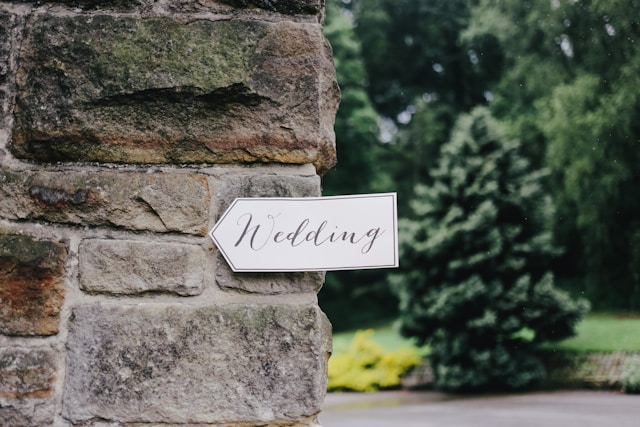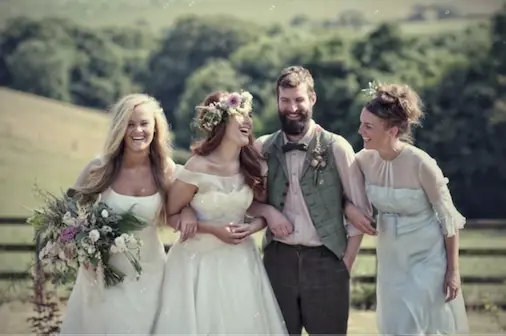Planning a wedding can be an exhilarating yet, at the same time, overwhelming adventure. With countless details to manage, ranging from selecting the perfect venue and establishing a budget to choosing flowers and coordinating guest arrangements, it’s easy to feel weighed down and daunted by the process. This is where a wedding planner can truly shine. These professionals are dedicated to transforming your wedding vision into reality while expertly navigating all the logistical challenges that arise along the way.

What Does a Wedding Planner Do?
A wedding planner is there to guide you through every aspect of planning and executing your wedding, from brainstorming initial ideas and managing your budget to selecting vendors and coordinating activities on the big day. Their goal is to provide a seamless and stress-free experience.
Your planner is your go-to person responsible for sourcing and managing aspects such as your venue, your caterer, entertainment, photography, videography, transport, accommodation, hair and makeup and cake, amongst many other things, ensuring that the day unfolds without drama or worry.
They know the ins and outs of a wedding, are aware of and able to resolve last-minute or unexpected difficulties which could occur on the day (despite the best planning) and are particularly useful when it comes to negotiating availability and pricing. They often work with specific vendors and have influence in negotiations with these vendors.
Wedding Planning:
Wedding planning can be divided into several key areas, each playing a vital role in creating the perfect day. These include budgeting, venue selection, guest list management, vendor selection (such as caterers and photographers), attire for the bride and bridal party, ceremony and reception details, and logistics like transportation and accommodation.
These areas are:
Budgeting:
- Setting a Realistic Budget: Establishing a foundation by determining how much can be spent across different aspects of the wedding.
- Allocating Funds: Deciding how to distribute the budget among essential elements such as the venue, catering, attire, photography, and more.
- Tracking Expenses: Keeping meticulous records of spending to ensure the couple stays within the established budget.
Venue Selection:
- Choosing the Right Location: Considering key factors like size, style, and amenities when selecting the venue.
- Ceremony and Reception: Deciding whether to host both the ceremony and reception at the same location or in separate venues.
- Capacity: Ensuring the venue can comfortably accommodate the guest list.
Guest List Management:
- Creating a Guest List: Identifying everyone who is to be invited to the wedding.
- Sending Save-the-Dates: Notifying guests of the date and location well in advance to ensure they can attend.
- Sending Invitations: Sending out formal invitations containing all the necessary details.
- Tracking RSVPs: Managing and logging responses to keep track of who will be attending.
Vendor Selection:
- Caterer: Choosing a caterer who aligns with culinary preferences and event needs.
- Photographer/Videographer: Hiring the right professionals to capture the memorable moments of the special day.
- Florist: Selecting a wedding florist to design the floral arrangements for both the ceremony and reception.
- DJ/Band: Choosing entertainment to keep guests engaged and lively throughout the event.
- Officiant/Celebrant: Selecting someone to conduct the wedding ceremony.
Attire:
- Bride’s Attire: Selecting the bride’s wedding dress along with any accessories that complement the look.
- Bridal Party Attire: Deciding on outfits for bridesmaids and groomsmen that align with the theme.
- Groom’s Attire: Choosing the groom’s suit or tuxedo to match the overall style of the wedding.
Ceremony and Reception Details:
- Ceremony: Planning the order of events, including readings and any special rituals or traditions.
- Reception: Organising seating arrangements, decorations, and entertainment for the reception.
- Decor: Choosing a cohesive style and theme that reflects the couple’s personality and vision.
- Cake: Selecting a wedding cake that complements the couple’s theme and tastes.
Logistics:
- Transportation: Arranging transportation for the bride and groom, the bridal party, and any guests as needed.
- Accommodation: Making and confirming reservations for guests who may need overnight accommodation.
- Contingency Planning: Preparing for unexpected events by having backup plans in place to ensure a smooth celebration.
What Role Does a Wedding Planner Play?
Wedding planners are there to shoulder most of the burden of planning a wedding, no matter the size, vision and expectations of the couple. Their responsibilities include:
Planning & Vision:
- Initial Consultation: Discussing the overall wedding vision, ideas, and budget to set a clear direction going forward.
- Theme & Style: Helping to develop a cohesive theme and style for the wedding that reflects the couple’s personality and goals for the day.
- Date Selection: Assisting in selecting the perfect wedding date, considering venue availability, budget, and preferences of the wedding party.
- Attire Recommendations: Suggesting reputable dress shops, tuxedo rentals, stylists, and makeup artists to help find the perfect look.
- Vendor Selection: Offering guidance in finding and choosing trusted vendors, including venues, caterers, florists, photographers, and more.
- Budget Management: Wedding planners help couples set a realistic budget and ensure that the event stays within financial constraints. They assist in allocating funds to different categories, ensuring that the most important elements are covered without overspending.
Logistics & Coordination:
- Vendor Recommendations and Negotiation: Acts as a liaison between you and your vendors, ensuring they understand your expectations. Planners typically have a network of trusted vendors, such as florists, caterers, photographers, and entertainers. By using this network, they can recommend professionals that align with the couple’s style and budget, saving time on research and interviews. They negotiate contracts with vendors to secure the best prices and terms.
- Timeline Creation: Designs a detailed timeline for the wedding day and rehearsal to ensure everything runs smoothly. This includes scheduling meetings with vendors, dress fittings, and even the moment the bride walks down the aisle.
- Venue Management: Coordinates with venue staff to ensure all logistics are in place and everything happens seamlessly.
- Design & Theme Concept: Wedding planners help bring a couple’s vision to life. This extends to everything from invitations to centrepieces and even the layout of the venue, ensuring that every element harmoniously reflects their personality and preferences. Whether the style is rustic, elegant or modern, wedding planners help couples choose colours, themes, and decorations that personify their unique vision.
- Day-of Coordination: Manages all details on the wedding day, including vendor coordination, setup, and handling any last-minute issues.
- Rehearsal Coordination: Organises and attends the wedding rehearsal to ensure everyone is prepared for the big day.
One of the biggest advantages of hiring a wedding planner is their ability to handle all the logistics. They coordinate the rehearsal, direct the ceremony, oversee the reception, and troubleshoot any unexpected issues that arise during the event.
Reduced Stress:
Wedding planning can be stressful, and a planner can take on a lot of the burden. They are aware that often emotions run high on the big day and the days leading up to it, and are calming influences, taking on and resolving worries and last-minute hiccups relating to coordination on the big day itself.
Expertise & Knowledge:
Planners have industry knowledge and experience that can help couples make informed decisions. Want an ice sculpture or an ice-cream wedding cake at a venue which is difficult to reach and simply not feasible? They will advise on best decisions to avoid disappointment and upset at the last minute.
Time Savings:
They can save valuable time by managing vendors, research, and other tasks.
Smooth Execution:
They ensure that all the details are taken care of, resulting in a seamless and memorable wedding day.
Managing the Unexpected:
A wedding planner is a dedicated problem solver. Whether it’s a vendor issue, an unexpected weather change, or any last-minute hiccup on the big day, planners step in to handle the stress, allowing the couple to stay focused on enjoying their celebration.
Benefits of Hiring a Wedding Planner
Weddings are notorious for being stressful. By entrusting the details to a planner, couples can relax and enjoy the engagement period without constantly worrying about timelines, budgets, or last-minute problems. Wedding planners bring years of experience and knowledge to the table. Having worked on countless weddings, they know how to navigate challenges, work with vendors, and keep things organised, ensuring a flawless event. Wedding planners save couples hours of research and decision-making. With their professional network and insider knowledge, they streamline the process and help couples make informed decisions quickly. Wedding planners are detail-oriented professionals who can manage every aspect of the event. They anticipate potential problems before they arise and handle them with calmness and patience, allowing the couple to stay focused on their relationship in the months leading up to the wedding.

